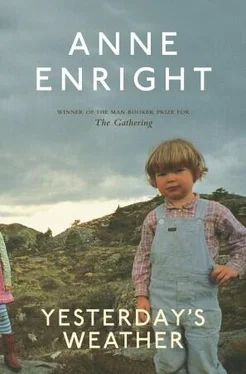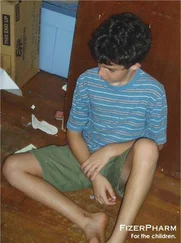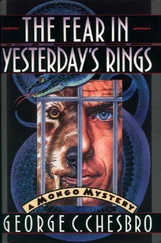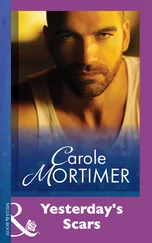Go for it, Gertie. St Matilda’s is proud of you yet.
She rang me up yesterday. She actually rang me up. She was terribly nice. I was terribly nice. I was smiling and nodding at the phone receiver like something demented.
‘Aha!’ I said. ‘Unhum!’ Then I put down the phone and went out and hacked down the sycamore that had suckered by the back wall. And of course it was too big for me, so the place is a mess of branches now, with an ignorant-looking stump left, all mutilated and half alive.
Because, strange to relate, I did marry a local man. And he does have a four-wheel drive. Which we need for the farm. But whatever way you cut it, eleven years after I left, I was back again in a white dress, walking down the aisle of the town church, that Gothic barn, the ghost of my childhood shifting her sticky knees on the green leatherette, Behave yourself now . The place was so cold my arms were mottled red and orange, poking out of the white dress like chicken legs. I was shaking — and not just with the cold. But sure they loved that too. Walking like something plucked in front of the sentimental, small eyes of that town. Isn’t she lovely? Saying later I had terrible circulation problems because of the drugs I did in New York, was it? Or Paris? Believe me, this is an outrageous place. But all places are outrageous, and I was in love.
Still am.
I don’t think Gertie understands ‘organic’. She rings me up yesterday out of the blue, and says she wants enough radicchio for forty.
‘Also,’ she says, and then a list as long as your arm. Well , I thought, the pure gall of it. But, ‘Aha!’ I said. ‘Unhum!’ I said I’d see what I had, because ‘with organic you don’t always have it on demand’.
‘Oh,’ she said.
I went out to polytunnels and I couldn’t find J.P. so I went to the toolshed and got out the handsaw and hacked at the poor sycamore until it was just a bleeding mess of green. It is very satisfying, cutting down a tree. You work small and the result is catastrophic: stand out of the way and, whoosh, the sky falls.
J.P. came up after a while.
‘What gives?’ he says.
‘Gertie wants radicchio for forty,’ I said.
‘Well, that’s good.’
‘Jesus, J.P.,’ I said. ‘Never buy a chainsaw.’
That evening I was all depressed. I walked under the plastic and listened to the sprinklers. I am not sentimental about vegetables, but I think I was crying. All the beautiful rows of green. I felt like ringing Gertie and saying that rabbits had got into the crop, or sawfly. Paraquat in the irrigation system. Anything. No more radicchio. The radicchio is all dead, Gertie.
Mam said, ‘Maybe it’s the start of something new. A change of heart. She’ll be ringing you up now, all the time.’ I don’t think Mam understands about the way my business is these days. I gritted my teeth and said, ‘Mam … I have two refrigerated vans a day going up to Dublin. One of them goes all the way to the airport because they eat my cima di rapa, which are just fancy turnip leaves, let’s face it, in effing London town. And now Gertie rings up ten years too late and says she wants my product. Ten years of her saying my carrots were delicious, of course, but a bit funny looking, and there was no demand for cima de rapa around here, and some of her customers actually picked the basil leaves out of their pasta and so what could you do?’
‘So what?’ says Mam. ‘You’ve won now.’
But it doesn’t feel like I’ve won. It didn’t sound like I’d won when I was talking to Gertie on the phone. It was a wedding, she said. The bride wanted organic — was very firm about it. And why wouldn’t she be, when her father ran half the cattle in the county? ‘If anyone knows what’s in the beef,’ said Gertie, ‘she does.’ And we had a bit of a laugh about that, before I hung up and went looking for some implement of destruction — any implement of destruction — and a tree to cut down.
I’m throwing my radicchio before swine.
When I married J.P. and turned him organic, Gertie ran the only restaurant for fifty miles. For the first five years we put off having kids, worked all the hours God sent — all that — and Gertie did take some stuff, now and then, to help us out. But she had one cook who was a demon for ‘posh’ food, everything drowned in ‘French’ sauce, and lots of spuds of course, and Has your daddy had enough? I think Gertie was afraid of her, actually. The other one had done a course at Ballymaloe and was very uppity for the first while. Of course, my problem was that I was uppity all the time (thank you, St Matilda’s) and so neither of them would touch one of my crooked, delicious carrots if her life depended on it. All that cleaning , they said. I know this because, for five years, every Saturday night, in the dim hopes of rustling up a bit of business, myself and J.P. took off our wellingtons, put on something half decent and went to eat in Gertie’s restaurant in town. We ate until it choked us. We ate, more precisely, until the children came along. And when we stopped, I actually missed it — there was nowhere else to go.
We have sandy soil, red and light. I went all the way to Westmeath for the organic manure, and brought the first lot back by trailer. We couldn’t afford a lorry. I made five trips.
‘Muck into gold,’ said J.P., shovelling it on. ‘Muck into gold.’ Now the tilth is so fine, it crumbles under your hand.
In year three I swung a deal with a small supplier in Smithfield. In year four I got our organic stamp. Prices went up. Over at Gertie’s, Has-Your-Daddy-Had-Enough said that there were ‘maggots’ in the potatoes, and the uppity one said that she ‘quite liked’ organic, but ‘you could get better organic elsewhere’. I bought my first van. I bought my second van. Every day they roared past Gertie’s door.
‘You know what kills me?’ I used to say to J.P. ‘If they started taking the stuff now, they’d say it was because it had improved. Or they’d decide the cos was OK, but the rest was as bad as ever. They’d tell me I should stick to cos. And there I’d be, selling cos to them and smiling. That’s what kills me.’
J.P. is out of sorts with all this. He is a reluctant sort of man. He likes working the land. I pretend this drives me mad, but of course it’s the thing that keeps me sane. Tonight he takes off his clothes as though they are a trial to him, as though that shirt of his has been at him all day. He puts them into the laundry basket and slaps the lid shut. Then, naked, he gets into bed: my organic man. He closes his eyes, rolls over to kiss my shoulder, rolls back, and sleeps.
At four in the morning I look out the bathroom window and see the poor sycamore oozing sap under a scudding sky. Such greedy trees, sycamores, nothing grows in their shade. I look into the mirror and think about Gertie. The sight of her praying in the school chapel at fifteen, with those lumpy-looking white gloves that girls used to wear when they were all overcome by the Virgin Mary. I think about the little bully she married; her mother, who always had some vague symptom. Her mother’s funeral, then, later. And my own father’s funeral, later again. Shaking Gertie’s hand.
‘I’m sorry for your trouble.’
God, I hate that woman. I put my hands on the side of the sink and lean forward and close my eyes. And I think of the food I must gather for Gertie: the beautiful plump lettuces, the purple sprouting broccoli, the early beans. I think about pulling them from the earth when they are still cool with the morning; settling them into their boxes, with the sweet air trapped among their leaves. I think about how I will gather them up, and pick them over, and pack them with a little knotted sprig of rosemary and thyme. I think how Gertie will take this little bouquet, and look at it, and like it. And I sigh.
Читать дальше












